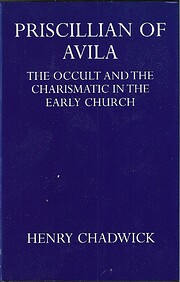

Cliquer sur une vignette pour aller sur Google Books.
|
Chargement... Priscillian of Avila : the occult and the charismatic in the early church (1976)par Henry Chadwick
 Aucun Actuellement, il n'y a pas de discussions au sujet de ce livre. aucune critique | ajouter une critique
Aucune description trouvée dans une bibliothèque |
Discussion en coursAucunCouvertures populaires
 Google Books — Chargement... Google Books — Chargement...GenresClassification décimale de Melvil (CDD)272.1Religions History, geographic treatment, biography of Christianity Persecutions Apostolic church by imperial Rome (1st-4th century)Classification de la Bibliothèque du CongrèsÉvaluationMoyenne: (5) (5)
Est-ce vous ?Devenez un(e) auteur LibraryThing. |
|||||||||||||||||||||||||||||||||||||||||||||||||||||||||||||||||||||||||||||||||||||||||||||||||||||||
THE OCCULT AND THE CHARISMATIC IN THE EARLY CHURCH
PREFACE
PRISCILLIAN, bishop of Avila 381-3, led an evangelical ascetic
movement in the Spanish churches, which encouraged charismatic
prophecy among both men and women, with the study of
heretical apocrypha. His frankly avowed interest in the occult left
him open to accusations of sorcery and Manicheism. In 38 5 he was
tortured and executed by imperial order at Trier, the first, and in
antiquity almost the only, herctic to suffer formal capital punishment
from the secular arm. The present study seeks to push
beyond the prevailing agnosticism of recent scholarship about
the character of his personal beliefs and to examine the social and
political pressures which produced the tragedy of his execution
The twentieth century, sceptical of the very existence of an
immaterial order of things, is increasingly absorbed, even mor
bidly fascinated, by the phenomena of the spirit world, the
charismatic gifts of spiritual power, and the hidden forces of evil and
witchcraft. The central figure of this book shared this double
fascination. While this is a technical historical study that seeks to
understand Priscillian in the context of the later Roman empire at
the time of its disintegration under the impact of barbarian
invasion and inflation, the story is not, I believe, of merely
antiquarian interest.
The second chapter, on the thought of Priscillian and his fol
lowers, is the core of the attempt to penetrate the mind of this
distant and strange man. But it will be a section to be read more
quickly by those who want the narrative of the man and his
tragedy and of the tenacious community in Galicia which, for
over 200 years, treasured the memory of his martyrdom at a
shrine which is a possible explanation of the mysterious origins
of Compostela
To make the narrative easier I have often used modern place
names. English readers are more familiar with Saragossa tan…